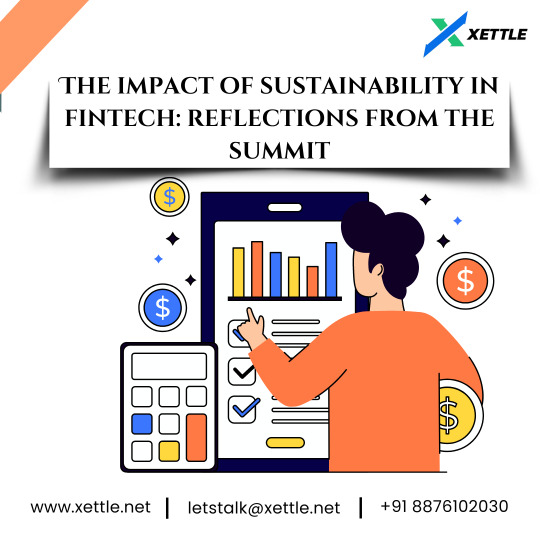#esg blockchain
Text
Top Blockchain Development Companies in Canada 2024 | ESG Blockchain Services
Leading blockchain development companies in Canada for 2024. Experts in ESG blockchain solutions to drive sustainable innovation and growth.
0 notes
Text
Founder Peter Kang’iri was brought up on family #coffee farms in #Kenya but he believes “you can’t put a greenback dollar on what it’s worth”. He wants to share with you the joy, happiness and benefits of delivering #ESG through #RWA and #blockchain #Seed2UrHeart
2 notes
·
View notes
Text
Tecnologia e Sustentabilidade: Como a Inovação Está Revolucionando o Futuro do ESG e Transformando Empresas"
Nos últimos anos, as discussões sobre Tecnologia e Sustentabilidade ganharam relevância em todas as esferas da sociedade. Com o mundo enfrentando desafios ambientais, sociais e econômicos sem precedentes, as empresas e os investidores passaram a adotar práticas de ESG (sigla em inglês para “Environmental, Social, and Governance” – Ambiental, Social e Governança) como parte fundamental de suas…
#Big Data e ESG#Blockchain e sustentabilidade#Carbono zero#cidades inteligentes#Crescimento sustentável#economia circular#energias renováveis#ESG#inovação tecnológica#Investimentos sustentáveis#IoT#Responsabilidade ambiental#Tecnologia e Sustentabilidade
0 notes
Text
Sustainable Fintech: Green Finance and Ethical Investing

As the world becomes increasingly conscious of environmental and social issues, the financial industry is undergoing a significant transformation. Sustainable finance and ethical investing are gaining momentum, driven by the need to address climate change, social inequality, and corporate governance. Fintech, with its innovative technologies and agile approach, is playing a pivotal role in supporting these trends. This blog explores how fintech is revolutionizing sustainable finance and ethical investing, and examines the broader impact of these developments on the financial industry.
The Rise of Sustainable Finance
Sustainable finance refers to financial activities that consider environmental, social, and governance (ESG) criteria to promote long-term sustainability and responsible investment. This approach aims to create value not only for investors but also for society and the environment.
Key Drivers of Sustainable Finance
Climate Change Awareness: Increasing awareness of climate change and its impacts has led to a demand for investments that support environmental sustainability.
Regulatory Pressure: Governments and regulatory bodies are implementing policies to encourage sustainable finance and penalize unsustainable practices.
Consumer Demand: Investors, especially millennials, are prioritizing ethical and sustainable investments, pushing financial institutions to adapt.
Fintech's Role in Green Finance
Fintech companies are at the forefront of the green finance revolution, leveraging technology to create innovative solutions that promote sustainability. Here are some ways fintech is driving green finance:
1. Green Bonds and Crowdfunding Platforms
Green bonds are debt instruments used to finance projects with environmental benefits. Fintech platforms are facilitating the issuance and trading of green bonds, making it easier for investors to support sustainable projects.
Example:
Neighborly: A fintech platform that connects investors with green municipal bond projects, allowing communities to fund sustainable infrastructure.
2. Digital Platforms for Ethical Investing
Fintech platforms are democratizing access to ethical investing by providing user-friendly interfaces and data-driven insights. These platforms allow investors to align their portfolios with their values.
Example:
OpenInvest: A platform that offers personalized, socially responsible investment portfolios, enabling users to invest in companies that align with their ethical values.
3. Blockchain for Transparency and Accountability
Blockchain technology enhances transparency and accountability in sustainable finance by providing immutable records of transactions and supply chains. This ensures that funds are used as intended and promotes trust among investors.
Example:
Everledger: A blockchain-based platform that tracks the provenance of diamonds and other assets, ensuring ethical sourcing and transparency.
4. AI and Big Data for ESG Analysis
Artificial intelligence (AI) and big data analytics enable fintech companies to analyze vast amounts of data and assess the ESG performance of companies. This helps investors make informed decisions based on reliable and comprehensive information.
Example:
Arabesque S-Ray: An AI-powered tool that evaluates the sustainability performance of companies based on ESG metrics, providing insights for ethical investing.
The Impact of Ethical Investing
Ethical investing, also known as socially responsible investing (SRI), involves choosing investments based on ethical and moral criteria. This approach not only aims for financial returns but also seeks to generate positive social and environmental outcomes.
Benefits of Ethical Investing
Positive Impact: Investors can support companies and projects that contribute to societal well-being and environmental sustainability.
Risk Mitigation: Companies with strong ESG practices are often more resilient to risks, making them attractive long-term investments.
Market Growth: The growing demand for ethical investments is driving innovation and expanding market opportunities for fintech companies.
Challenges and Opportunities
While sustainable fintech presents significant opportunities, it also faces challenges that need to be addressed to realize its full potential:
1. Standardization of ESG Metrics
The lack of standardized ESG metrics makes it difficult to compare the sustainability performance of different companies. Developing common standards and frameworks is essential for consistent and reliable ESG assessment.
2. Greenwashing Concerns
Greenwashing, where companies falsely portray themselves as environmentally friendly, can undermine investor trust. Fintech companies must ensure transparency and authenticity in their sustainability claims.
3. Regulatory Compliance
Navigating the complex regulatory landscape of sustainable finance requires fintech companies to stay abreast of evolving policies and ensure compliance with international standards.
4. Technological Integration
Integrating advanced technologies like AI, blockchain, and big data analytics into traditional financial systems requires significant investment and expertise. Fintech companies need to collaborate with financial institutions to achieve seamless integration.
The Future of Sustainable Fintech
The future of sustainable fintech looks promising, with continued innovation and collaboration driving growth and impact. Here are some trends to watch:
1. Increased Adoption of Green Digital Banking
Digital banks that prioritize sustainability, such as offering eco-friendly banking products and investing in green projects, are likely to gain traction.
2. Expansion of Impact Investing
Impact investing, which seeks to generate measurable social and environmental impact alongside financial returns, will continue to grow, supported by fintech innovations.
3. Development of Sustainable Finance Standards
The establishment of global standards and frameworks for sustainable finance will enhance transparency and accountability, fostering greater investor confidence.
4. Integration of ESG into Mainstream Finance
As ESG considerations become integral to investment strategies, traditional financial institutions will increasingly adopt fintech solutions to support sustainable finance.
Conclusion
Sustainable fintech is transforming the financial industry by promoting green finance and ethical investing. Through innovative technologies and solutions, fintech companies are making it easier for investors to support sustainable and socially responsible initiatives. While challenges remain, the potential for positive impact is immense. By continuing to innovate and collaborate, fintech can play a crucial role in advancing sustainable finance and creating a more inclusive and equitable financial system.
#sustainable fintech#green finance#ethical investing#ESG#blockchain#AI in fintech#ethical investments#fintech innovations#sustainable finance#impact investing
1 note
·
View note
Text
Blockchain for ESG
ESG stands for Environmental, Social, and Governance, and aims to establish an assessment of companies’ social and environmental responsibilities
0 notes
Link
In today’s world, the focus on environmental, social, and governance (ESG) initiatives is rapidly growing. These initiatives have become vital benchmarks for businesses seeking investments from socially conscious investors who prioritize the impact on society. As a result, companies are allocating significant financial resources, amounting to billions of dollars, towards ESG initiatives.
0 notes
Text

Blockchain for ESG: Blockchain Uses and reporting
ESG stands for Environmental, Social, and Governance, and aims to establish an assessment of companies’ social and environmental responsibil
Kalima Blockchain
0 notes
Text

#finanace management#digital money#blockchain#baas#esg investing#esg funds#esg trends#mlops#finance#pgdm in finance#investing#finance management distance learning#distance courses#distance mba#distance learning mba
0 notes
Text
Best 10 Business Strategies for year 2024
In 2024 and beyond, businesses will have to change with the times and adjust their approach based on new and existing market realities. The following are the best 10 business approach that will help companies to prosper in coming year
1. Embrace Sustainability
The days when sustainability was discretionary are long gone. Businesses need to incorporate environmental, social and governance (ESG) values into their business practices. In the same vein, brands can improve brand identity and appeal to environmental advocates by using renewable forms of energy or minimizing their carbon footprints.
Example: a fashion brand can rethink the materials to use organic cotton and recycled for their clothing lines. They can also run a take-back scheme, allowing customers to return old clothes for recycling (not only reducing waste but creating and supporting the circular economy).
2. Leverage AI

AI is revolutionizing business operations. Using AI-fuelled solutions means that you can automate processes, bring in positive customer experiences, and get insights. AI chatbots: AI can be utilized in the form of a conversational entity to support and perform backend operations, as well.
With a bit more specificity, say for example that an AI-powered recommendation engine recommends products to customers based on their browsing history and purchase patterns (as the use case of retail). This helps to increase the sales and improve the shopping experience.
3. Prioritize Cybersecurity
Cybersecurity is of utmost important as more and more business transitions towards digital platforms. Businesses need to part with a more substantial amount of money on advanced protective measures so that they can keep sensitive data private and continue earning consumer trust. Regular security audits and training of employees can reduce these risks.
Example: A financial services firm may implement multi-factor authentication (MFA) for all online transactions, regularly control access to Internet-facing administrative interfaces and service ports as well as the encryption protocols to secure client data from cyberattacks.
4. Optimizing Remote and Hybrid Working Models

Remote / hybrid is the new normal Remote teams force companies to implement effective motivation and management strategies. Collaboration tools and a balanced virtual culture can improve productivity and employee satisfaction.
- Illustration: a Tech company using Asana / Trello etc. for pm to keep remote teams from falling out of balance. They can also organise weekly team-building activities to keep a strong team spirit.
5. Focus on Customer Experience
Retention and growth of the sales follow-through can be tied to high quality customer experiences. Harness data analytics to deepen customer insights and personalize product offers making your marketing campaigns personal: a customer support that is responsive enough can drive a great level of returning customers.
Example – For any e-commerce business, you can take user experience feedback tools to know about how your customers are getting along and make necessary changes. Custom email campaigns and loyalty programs can also be positively associated with customer satisfaction and retention.
6. Digitalization Investment

It is only the beginning of digital transformation which we all know, is key to global competitiveness. For streamlining, companies have to adopt the use advanced technologies such as Blockchain Technology and Internet of Things (IoT) in conjunction with cloud computing.
IoT example : real-time tracking and analytics to optimize supply chain management
7. Enhance Employee Skills
Develop Your Employees: Investing in employee development is key to succeeding as a business. The training is provided for the folks of various industries and so employees can increase their skills that are needed to work in a certain company. Employee performance can be enhanced by providing training programs in future technology skills and soft skills and job satisfaction.
Example: A marketing agency can host webinars or create courses to teach people the latest digital marketing trends and tools This can help to keep employees in the know which results in boosting their skills, making your campaigns successful.
8. Diversify Supply Chains

The ongoing pandemic has exposed the weaknesses of global supply chains. …diversify its supply base and promote the manufacturing of drugs in Nigeria to eliminate total dependence on a single source. In return, this approach increases resilience and reduces exposure to the risks of supply chain interruption.
- E.g., a consumer electronics company can source components from many suppliers in various regions. In so doing, this alleviates avoidable supply chain interruptions during times of political tensions or when disasters hit.
9. Make Decisions Based on Data
A business database is an asset for businesses. By implementing data, they allow you to make decisions based on the data that your analytics tools are providing. For example, sales analysis lets you track trends and better tailor your goods to the market.
Example: A retail chain can use data analytics to find out when a customer buys, and it change their purchasing policies. This can also reduce overstock and stockouts while overall, increasing efficiency.
10. Foster Innovation

Business Growth Innovation is Key A culture of creativity and experimentation should be established in companies. Funding R&D and teaming with startups can open many doors to both solve problems creatively but also tap into new markets.
Example: A software development firm could create an innovation lab where team members are freed to work on speculative projects. Moreover, work with start-ups on new technologies and solutions.
By adopting these strategies, businesses can navigate the turbulence for 2024 and roll up market — progressive.AI with an evolving dynamic market, being ahead of trends and updated is most likely will help you thrive in the business landscape.
#ai#business#business strategy#business growth#startup#fintech#technology#tech#innovation#ai in business
2 notes
·
View notes
Text
Top Blockchain Development Services Companies in Canada 2024 | AskGalore
Leading blockchain development companies in Canada offering ESG blockchain solutions in 2024. Hire expert blockchain developers for innovative projects with AskGalore's curated list.
#blockchain development company in Canada#esg blockchain#hire blockchain developers#blockchain developers#blockchain development companies
0 notes
Text
As they depart Kenya, Olinga and Barbara rejoice in the fantastic time they have had meeting Peter and Margaret, Patrick, and all the amazing colleagues here in Nairobi and in the Asili Coffee farms. Wonderful friendships have been formed, and they go back with renewed energy in Asili Coffee
0 notes
Text
The impact of sustainability in fintech: reflections from the summit

In recent years, the Fintech industry has witnessed a paradigm shift towards sustainability, with an increasing emphasis on integrating environmental, social, and governance (ESG) factors into financial decision-making processes. This transformative trend took center stage at the latest Fintech Summit, where industry leaders converged to explore the intersection of sustainability and financial technology. Among the prominent voices shaping this discourse was Xettle Technologies, a trailblazer in Fintech software solutions, whose commitment to sustainability is driving innovation and reshaping the future of finance.
Against the backdrop of global challenges such as climate change, resource depletion, and social inequality, the imperative for sustainable finance has never been greater. The Fintech Summit provided a platform for thought leaders to reflect on the role of technology in advancing sustainability goals and fostering a more resilient and equitable financial ecosystem.
At the heart of the discussions was the recognition that sustainability is not just a moral imperative but also a strategic imperative for Fintech firms. By integrating ESG considerations into their operations, products, and services, Fintech companies can mitigate risks, enhance resilience, and unlock new opportunities for growth and value creation. Xettle Technologies’ representatives underscored the company’s commitment to sustainability, highlighting how it is embedded in the company’s culture, innovation agenda, and business strategy.
One of the key themes that emerged from the summit was the role of Fintech in driving sustainable investment. Through innovative solutions such as green bonds, impact investing platforms, and ESG scoring algorithms, Fintech firms are empowering investors to allocate capital towards environmentally and socially responsible projects and companies. Xettle Technologies showcased its suite of Fintech software solutions designed to facilitate sustainable investing, enabling financial institutions and investors to align their portfolios with their values and sustainability objectives.
Moreover, the summit explored the transformative potential of blockchain technology in advancing sustainability goals. By enhancing transparency, traceability, and accountability in supply chains, blockchain can help address issues such as deforestation, forced labor, and conflict minerals. Xettle Technologies’ experts elaborated on the company’s blockchain-based solutions for supply chain finance and sustainability reporting, emphasizing their role in promoting ethical sourcing, responsible production, and fair labor practices.
In addition to sustainable investing and supply chain transparency, the summit delved into the role of Fintech in promoting financial inclusion and resilience. By leveraging technology and data analytics, Fintech firms can expand access to financial services for underserved populations, empower small and medium-sized enterprises (SMEs), and build more inclusive and resilient communities. Xettle Technologies’ representatives shared insights into the company’s initiatives to support financial inclusion through digital payments, microfinance, and alternative credit scoring models.
Furthermore, the summit highlighted the importance of collaboration and partnership in advancing sustainability goals. Recognizing the interconnected nature of sustainability challenges, participants underscored the need for cross-sectoral collaboration between Fintech firms, financial institutions, governments, civil society, and academia. Xettle Technologies reiterated its commitment to collaboration, emphasizing its partnerships with industry stakeholders to drive collective action and scale impact.
Looking ahead, the future of sustainability in Fintech appears promising yet complex. As Fintech firms continue to innovate and disrupt traditional financial systems, they must prioritize sustainability as a core principle and driver of value creation. Xettle Technologies’ visionaries reiterated their commitment to sustainability, pledging to harness the power of technology to build a more sustainable, inclusive, and resilient financial ecosystem for future generations.
In conclusion, the Fintech Summit served as a catalyst for reflection and action on the role of sustainability in shaping the future of finance. From sustainable investing and supply chain transparency to financial inclusion and resilience, Fintech has the potential to drive positive change and advance sustainability goals on a global scale. Xettle Technologies’ leadership in integrating sustainability into its Fintech solutions exemplifies its dedication to driving innovation and creating shared value for society and the planet. As the industry continues to evolve, collaboration, innovation, and sustainability will be key drivers of success in building a more sustainable and resilient financial future.
2 notes
·
View notes
Text
Unravelling Audit Trends: A Guide for Accountants and Auditors in Dubai
Welcome, accountants and auditors in Dubai, to an insightful exploration of the latest audit trends shaping our vibrant industry landscape. In this guide, we'll delve into key trends, technological advancements, regulatory shifts, and best practices that are essential for your success in Dubai's dynamic financial sector.
Regulatory Updates: Stay ahead of the game by keeping abreast of the latest regulatory changes in Dubai. From updates in financial reporting standards to compliance requirements, understanding and adapting to these changes is crucial for ensuring accurate and compliant audits.
Technology Integration: Embrace the power of technology to enhance your audit processes. AI-driven analytics, cloud-based platforms, and automation tools can streamline auditing tasks, improve accuracy, and provide deeper insights into financial data, ultimately saving time and resources.
Best Practices: Elevate your audit game with best practices focused on risk assessment, internal control evaluation, and fraud detection. Proactive measures and robust strategies in these areas can strengthen audit outcomes, instill client trust, and mitigate risks effectively.
Sustainability Reporting: With sustainability gaining prominence, auditors in Dubai play a pivotal role in verifying and enhancing the credibility of sustainability reports. Incorporating ESG factors into audits is becoming increasingly important, reflecting the growing emphasis on corporate responsibility.
Blockchain Revolution: Explore the potential of blockchain technology in auditing. Its features such as enhanced data security, transparency, and immutability are transforming audit trails and ensuring the integrity of financial information, offering auditors innovative solutions to improve audit efficiency and reliability.
Future Outlook: The future of auditing in Dubai is promising for those who embrace change and innovation. Continuous learning, upskilling in technology, and maintaining compliance with evolving standards will be key drivers of success in the ever-evolving audit landscape.
By staying informed, leveraging technology, adopting best practices, and embracing innovation, accountants and auditors in Dubai can navigate through challenges, deliver value-added services, and drive excellence in auditing practices, cementing their position as trusted financial advisors in the region.
#DubaiAuditors#AuditTrends#AccountantsInDubai#RegulatoryChanges#TechIntegration#BestAuditPractices#SustainabilityReporting#BlockchainAuditing#FutureOfAuditing#FinancialCompliance#ESGStandards#AuditInnovation#AuditTech#DubaiFinance#AuditInsights#dubaibusiness#business strategy#uaebusiness
3 notes
·
View notes
Text
How Fintech is Supporting Environmental, Social, and Governance (ESG) Initiatives

Introduction
In recent years, Environmental, Social, and Governance (ESG) initiatives have become an essential focus for businesses and investors alike. Companies are expected to operate sustainably, prioritize social responsibility, and maintain transparency in governance practices. This growing focus on ESG has created a significant opportunity for fintech companies to play a vital role in promoting and supporting these initiatives. Fintech is helping businesses and investors align their financial strategies with sustainability goals through innovative solutions that prioritize ESG values.
This article explores how fintech is driving change by supporting ESG initiatives and fostering a future where finance not only creates wealth but also contributes to a more sustainable and equitable world.
1. Promoting Green Finance and Sustainability
One of the most impactful ways fintech supports ESG initiatives is through green finance. Fintech platforms are developing innovative financial products that prioritize environmental sustainability, enabling businesses and individuals to make environmentally conscious decisions.
a. Green Bonds and Sustainable Investment Platforms
Fintech companies have introduced platforms that facilitate green bonds, which are debt instruments used to finance projects with environmental benefits, such as renewable energy or climate adaptation. Additionally, many fintech-driven investment platforms now allow users to choose portfolios that prioritize sustainable investments. This democratizes access to green investments, encouraging more people to allocate funds to projects that have a positive environmental impact.
b. Carbon Tracking and Offsetting Solutions
Some fintech startups are offering carbon tracking and offsetting solutions, allowing businesses and individuals to monitor their carbon footprints and take steps to reduce or offset their emissions. By integrating sustainability metrics into everyday financial activities, fintech is enabling users to make more informed and eco-friendly financial decisions.
Key Takeaway: Fintech is actively promoting green finance by creating products and platforms that prioritize sustainability, encouraging responsible investment and supporting environmental goals.
2. Advancing Financial Inclusion for Social Impact
Fintech’s role in promoting financial inclusion aligns with the social component of ESG initiatives. In regions where traditional financial services are inaccessible or prohibitively expensive, fintech has been instrumental in providing people with access to banking, credit, and investment services.
a. Empowering Underserved Communities
Fintech platforms, particularly mobile banking and microfinance apps, are empowering underserved and unbanked communities around the world. By providing easy-to-use digital tools, fintech is allowing individuals in remote areas to access financial services that can help lift them out of poverty, create businesses, and improve their economic well-being.
b. Social Impact Investing
Through fintech platforms, users can now engage in social impact investing, where they can direct their funds toward companies and projects that contribute positively to society. From improving healthcare access to supporting education, these platforms allow investors to align their financial goals with their social values.
Key Takeaway: Fintech is driving social impact by advancing financial inclusion and creating platforms that enable individuals to support social good through targeted investments.
3. Enhancing Corporate Governance and Transparency
Governance is a critical component of ESG, and fintech is playing a crucial role in improving transparency and accountability in corporate governance.
a. Blockchain for Transparent Transactions
One of the most transformative fintech technologies supporting better governance is blockchain. Blockchain's decentralized and immutable nature ensures that all financial transactions are transparent and verifiable. This level of transparency helps prevent corruption, fraud, and misconduct, fostering greater trust between companies and their stakeholders.
b. Real-Time Compliance and Reporting Tools
Fintech has introduced regtech solutions that enable companies to improve their compliance with regulatory standards and ESG-related reporting requirements. These real-time compliance tools help businesses adhere to governance best practices, mitigate risks, and ensure they are meeting sustainability and ethical obligations.
Key Takeaway: Fintech is improving corporate governance by enhancing transparency through blockchain and providing real-time compliance tools to ensure businesses meet their governance commitments.
4. Driving Innovation in ESG Data and Analytics
Data is at the heart of ESG initiatives, and fintech companies are driving innovation in how ESG data is collected, analyzed, and used to inform decision-making.
a. ESG Scoring and Reporting Platforms
Fintech platforms now provide ESG scoring and reporting tools that help investors assess the sustainability and social responsibility of companies before making investment decisions. These tools use advanced algorithms and data analytics to evaluate a company's environmental, social, and governance practices, providing investors with the insights they need to align their portfolios with ESG principles.
b. Predictive Analytics for Sustainable Decision-Making
Some fintech platforms are leveraging predictive analytics to help businesses and investors anticipate trends in ESG performance and make data-driven decisions. These insights can guide companies in improving their ESG strategies and allow investors to capitalize on future opportunities related to sustainability and ethical governance.
Key Takeaway: Fintech is revolutionizing how ESG data is collected and analyzed, offering powerful tools for businesses and investors to make informed decisions that align with sustainability goals.
5. Supporting Circular Economy and Sustainable Consumption
The transition to a circular economy, where resources are reused and waste is minimized, is essential for achieving global sustainability goals. Fintech is contributing to this shift by supporting platforms that promote sustainable consumption and investment in circular economy projects.
a. Crowdfunding for Circular Economy Projects
Fintech platforms have made it easier to crowdfund circular economy projects, such as recycling initiatives, sustainable manufacturing processes, and renewable energy ventures. These platforms connect socially-conscious investors with projects that prioritize resource efficiency and long-term sustainability.
b. Fintech Solutions for Ethical Consumerism
Some fintech apps are helping consumers make more sustainable purchasing decisions by providing ethical consumerism tools. These apps track the environmental and social impact of a consumer’s spending habits and offer recommendations for more responsible purchasing choices, thereby supporting the circular economy.
Key Takeaway: Fintech is aiding the transition to a circular economy by facilitating investment in sustainable projects and empowering consumers to make more ethical financial decisions.
Conclusion
As businesses and investors increasingly prioritize ESG initiatives, fintech is emerging as a critical enabler of these efforts. From promoting green finance to advancing social impact and improving corporate governance, fintech is driving innovation and creating tools that support sustainability, equity, and transparency in the financial systemHow Fintech is Supporting Environmental, Social, and Governance (ESG) Initiatives
Introduction
In recent years, Environmental, Social, and Governance (ESG) initiatives have become an essential focus for businesses and investors alike. Companies are expected to operate sustainably, prioritize social responsibility, and maintain transparency in governance practices. This growing focus on ESG has created a significant opportunity for fintech companies to play a vital role in promoting and supporting these initiatives. Fintech is helping businesses and investors align their financial strategies with sustainability goals through innovative solutions that prioritize ESG values.
This article explores how fintech is driving change by supporting ESG initiatives and fostering a future where finance not only creates wealth but also contributes to a more sustainable and equitable world.
1. Promoting Green Finance and Sustainability
One of the most impactful ways fintech supports ESG initiatives is through green finance. Fintech platforms are developing innovative financial products that prioritize environmental sustainability, enabling businesses and individuals to make environmentally conscious decisions.
a. Green Bonds and Sustainable Investment Platforms
Fintech companies have introduced platforms that facilitate green bonds, which are debt instruments used to finance projects with environmental benefits, such as renewable energy or climate adaptation. Additionally, many fintech-driven investment platforms now allow users to choose portfolios that prioritize sustainable investments. This democratizes access to green investments, encouraging more people to allocate funds to projects that have a positive environmental impact.
b. Carbon Tracking and Offsetting Solutions
Some fintech startups are offering carbon tracking and offsetting solutions, allowing businesses and individuals to monitor their carbon footprints and take steps to reduce or offset their emissions. By integrating sustainability metrics into everyday financial activities, fintech is enabling users to make more informed and eco-friendly financial decisions.
Key Takeaway: Fintech is actively promoting green finance by creating products and platforms that prioritize sustainability, encouraging responsible investment and supporting environmental goals.
2. Advancing Financial Inclusion for Social Impact
Fintech’s role in promoting financial inclusion aligns with the social component of ESG initiatives. In regions where traditional financial services are inaccessible or prohibitively expensive, fintech has been instrumental in providing people with access to banking, credit, and investment services.
a. Empowering Underserved Communities
Fintech platforms, particularly mobile banking and microfinance apps, are empowering underserved and unbanked communities around the world. By providing easy-to-use digital tools, fintech is allowing individuals in remote areas to access financial services that can help lift them out of poverty, create businesses, and improve their economic well-being.
b. Social Impact Investing
Through fintech platforms, users can now engage in social impact investing, where they can direct their funds toward companies and projects that contribute positively to society. From improving healthcare access to supporting education, these platforms allow investors to align their financial goals with their social values.
Key Takeaway: Fintech is driving social impact by advancing financial inclusion and creating platforms that enable individuals to support social good through targeted investments.
3. Enhancing Corporate Governance and Transparency
Governance is a critical component of ESG, and fintech is playing a crucial role in improving transparency and accountability in corporate governance.
a. Blockchain for Transparent Transactions
One of the most transformative fintech technologies supporting better governance is blockchain. Blockchain's decentralized and immutable nature ensures that all financial transactions are transparent and verifiable. This level of transparency helps prevent corruption, fraud, and misconduct, fostering greater trust between companies and their stakeholders.
b. Real-Time Compliance and Reporting Tools
Fintech has introduced regtech solutions that enable companies to improve their compliance with regulatory standards and ESG-related reporting requirements. These real-time compliance tools help businesses adhere to governance best practices, mitigate risks, and ensure they are meeting sustainability and ethical obligations.
Key Takeaway: Fintech is improving corporate governance by enhancing transparency through blockchain and providing real-time compliance tools to ensure businesses meet their governance commitments.
4. Driving Innovation in ESG Data and Analytics
Data is at the heart of ESG initiatives, and fintech companies are driving innovation in how ESG data is collected, analyzed, and used to inform decision-making.
a. ESG Scoring and Reporting Platforms
Fintech platforms now provide ESG scoring and reporting tools that help investors assess the sustainability and social responsibility of companies before making investment decisions. These tools use advanced algorithms and data analytics to evaluate a company's environmental, social, and governance practices, providing investors with the insights they need to align their portfolios with ESG principles.
b. Predictive Analytics for Sustainable Decision-Making
Some fintech platforms are leveraging predictive analytics to help businesses and investors anticipate trends in ESG performance and make data-driven decisions. These insights can guide companies in improving their ESG strategies and allow investors to capitalize on future opportunities related to sustainability and ethical governance.
Key Takeaway: Fintech is revolutionizing how ESG data is collected and analyzed, offering powerful tools for businesses and investors to make informed decisions that align with sustainability goals.
5. Supporting Circular Economy and Sustainable Consumption
The transition to a circular economy, where resources are reused and waste is minimized, is essential for achieving global sustainability goals. Fintech is contributing to this shift by supporting platforms that promote sustainable consumption and investment in circular economy projects.
a. Crowdfunding for Circular Economy Projects
Fintech platforms have made it easier to crowdfund circular economy projects, such as recycling initiatives, sustainable manufacturing processes, and renewable energy ventures. These platforms connect socially-conscious investors with projects that prioritize resource efficiency and long-term sustainability.
b. Fintech Solutions for Ethical Consumerism
Some fintech apps are helping consumers make more sustainable purchasing decisions by providing ethical consumerism tools. These apps track the environmental and social impact of a consumer’s spending habits and offer recommendations for more responsible purchasing choices, thereby supporting the circular economy.
Key Takeaway: Fintech is aiding the transition to a circular economy by facilitating investment in sustainable projects and empowering consumers to make more ethical financial decisions.
Outcome
As businesses and investors increasingly prioritize ESG initiatives, fintech is emerging as a critical enabler of these efforts. From promoting green finance to advancing social impact and improving corporate governance, fintech is driving innovation and creating tools that support sustainability, equity, and transparency in the financial system
#FintechForESG#ESGInitiatives#SustainableFinance#FintechInnovation#SocialImpact#GreenFinance#FutureOfFinance#ResponsibleInvesting
0 notes